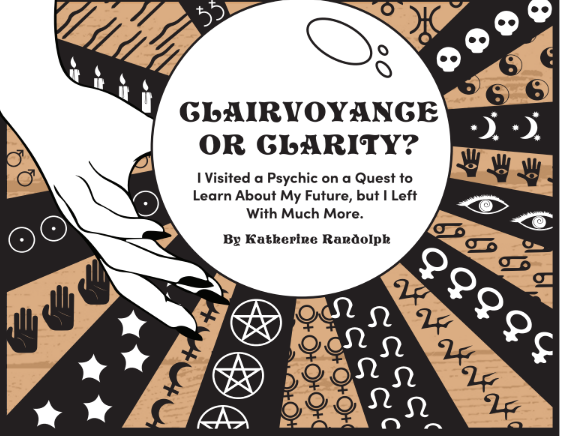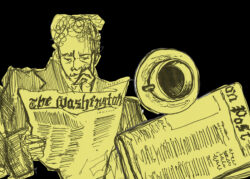I Visited a psychic on a quest to learn about my Future, but I left with much more.
Mrs. Natalie Tarot Readings of Georgetown is situated in a tiny, dimly lit shop at the corner of Wisconsin and P Street. The window is crowded with suspended glittering stars and moons, a palmistry guide, and an assortment of crystals. Inside, paintings adorn the walls, and red curtains divide the small space into a waiting area and two reading rooms.
In early July, Mrs. Natalie informed me I would meet the love of my life within three weeks and marry them in 10 years. Normally, I wouldn’t have given this information about my supposed soulmate a second thought, but her confidence was compelling.
According to Mrs. Natalie, I’m a creative person, a writer probably, and I’ll eventually have to make a huge choice from four options. She also told me that there was a dark, toxic person in my life that I needed to push away.
I’ve been a Christian my entire life, and I think of myself as someone who believes in the scientific and the explainable. And yet, for days after my reading with Mrs. Natalie, I discussed her predictions with friends and dissected her description of my future spouse. It quickly became apparent to me that my visit to Mrs. Natalie was less about understanding my future and more about understanding myself. I walked into the shop hoping for an accurate reading that wouldn’t scam me out of my money, and left with insight into my own anxiety about the future.
***
Psychics claim to be able to access and interpret nonphysical and supernatural forces, through palm readings, Tarot cards, and crystal balls. According to the Pew Research Center, 32 percent of America’s most religious demographic—those who attend weekly services—believe in psychics. On the opposite end of the spectrum, 11 percent of those classified by Pew as “solidly secular” believe in psychics.
Why do people turn to psychics in the face of the uncertain? Georgetown sociology professor William Daddio says that people who might consider themselves reasonable often turn to clairvoyance in times of confusion or after other avenues have been exhausted.
“People are looking for answers. So if they don’t find them, they’ll say ‘well, let me try this,’” Daddio said. For college students, Daddio pointed to post-graduation insecurity as a reason some might visit a clairvoyant. “You’re on a future mission right now. You’re in school; you’re looking at what you want to be; you’re in very concrete steps. But over a period of time, people become unhappy, so they tend to try looking at other options.”
Psychics, seers, soothsayers, and clairvoyants have existed throughout recorded history. They have taken the form of biblical prophets such as John or Elijah, who were known for their ability to communicate with divine forces. Ancient Greeks travelled to see the Oracle of Delphi make predictions about the future. In 1555, French astrologer Nostradamus published Les Prophéties, a collection of poems that many believed predicted major historical events.
Today, fortune telling is a growing industry. In a 2016 report, business research firm IBISWorld estimated that the total market for psychics’ services was worth $2.1 billion in the United States alone. Within a mile of Georgetown’s front gates, four separate storefronts claim to offer clairvoyant services, including Mrs. Natalie, who declined to be interviewed for this article. She wasn’t alone. I visited every psychic shop in Georgetown seeking interviews for this story, and every one refused to speak with me.
My search for a psychic to interview brought me to Baltimore, Maryland, where K.C. Lane has been in business for 13 years. Five years ago, she left her job in software development to run her shop full time. Lane said that she does not have trouble attracting enough customers to make a living because she believes that divine forces bring them to her business.
“I feel like if the person’s meant to be there it’s all kind of guided,” Lane said. “I’ve never advertised really in my entire life, and I’ve never one time ran out of clients in 13 years.” Lane is a medium, which means that she offers clients the opportunity to connect with deceased loved ones.
Lane has noticed that her clients are mostly women, spanning ages 21 to 68, who have some form of higher education. Many of them are teachers or businesspeople, but she specifically noted that a large portion of her clientele work in medicine.
“They’re at least 25 percent of my clientele, healing fields,” Lane said. “Nurses in particular are fascinated with their dealing with life and death issues all the time.”
Lane believes that female clients in the professional sphere are particularly drawn to her because of her history in software development. “I believe that like energy attracts like energy and because I’m a professional woman myself, and I have a very nice environment I read out of, they seem to prefer me.”
When I asked her about the shops in the Georgetown neighborhood, just a short walk away from campus, Lane carefully differentiated herself from psychics who operate in areas that attract tourists or students, like Georgetown. “They are a different type of psychic,” she said. “It’s a very different type of reading than someone who’s just sitting there reading Tarot cards who claims to be a psychic.”
For Bob Nygaard, a private investigator based in Florida who has gained notoriety investigating psychic scams, Lane is drawing distinctions where a difference does not exist. Nygaard spent a decade tracking down Maryland psychic Gina Marie Marks, who pleaded guilty in 2018 to felony theft for scamming five clients out of $341,000 and was sentenced to six years in prison. Nygaard said that all that separates Lane from the psychics in Georgetown is the customers they target.
“One of the reasons that they would pick an area where there’s a lot of tourists is because they know that if they can get a good hit and make some money, then the tourists won’t be around to go to court in the future,” Nygaard said of the storefronts near the campus.
Psychics like Marks often seek out clients who are particularly vulnerable, and then promise to lift curses, solve problems, or bring back lost loved ones if the patron is willing to spend extra money. The scheme starts out with a regular reading and then escalates until the victim has spent thousands of dollars. The scams can take place over the course of months, and according to Daddio, victims might return for another reading even after they realize that something isn’t quite right with their psychic.
“One, it’s the hope. It’s the psychological need to see if they can make that connection,” Daddio said. “Number two, what happens sometimes, is that once you get into it, you don’t want to admit that you’re wrong. You continue on, you want to believe it now, because otherwise you have to admit that you were taken advantage of.”
Nygaard described a case in which Marks claimed she would cure a child of autism in exchange for his mother’s money. Nygaard accused Marks of making promises that she knew she couldn’t fulfill and targeting a desperate parent.
“When that woman takes her child to the doctor and the doctor says, ‘that child has autism,’ there is no cure for that,” he said. “But then she goes to Gina Marks and Gina Marks says, ‘I’m gonna use my special supernatural powers, and I’m going to help cure the child of autism.’ That’s very powerful to a mother who wants her son to be cured.”
Others seek psychic’s services out of curiosity rather than in the hopes of solving a specific problem. This summer, Catie Tresslar (COL ’20) and three friends got palm readings from a psychic named Amy in Manhattan, New York. Amy, who could not be reached for comment, only took cash from her clients and operated out of her apartment. Tresslar found Amy through Yelp when she looked for psychics, with an eye toward cost first and quality second. One Yelp review claims that Amy once asked a client for $585 to heal a curse, but Amy did not ask Tresslar’s party for any money beyond the cost of their reading. She left the reading uncertain whether Amy possessed psychic abilities.
Amy told Tresslar that she’d be travelling somewhere, most likely California, in October or November. Tresslar is from Chicago and has never visited the West Coast. Amy projected that Tresslar has a bold, stubborn personality, and told her that Aug. 17 would be a good day for her. Tresslar recalled the date as being a perfectly fine one, but not particularly special. Though she isn’t sure how accurate the reading was, Tresslar said she would be open to visiting a psychic again.
For Tresslar, Amy’s potential fraudulence wasn’t a dealbreaker. Tresslar’s skepticism did not render her reading meaningless. Instead, like my reading, the value of her encounter with clairvoyance was in the feeling it evoked, the feeling that a psychic’s reading might become a kind of self-fulfilling prophecy. I can’t know whether psychics understand that phenomenon—whether they harbor their own skepticism about their ability to predict the future—but still, my experience and the experience Tresslar had leave me wondering whether the veracity of their claims matters at all.
Lane recognizes that others in the industry have taken advantage of clients but insists that she’s in it for the right reasons. She said that she will not make predictions about three topics: health issues, when someone will die, and accusations of criminal activities. According to Maryland law, it’s illegal for her to offer health advice to her patrons without a medical license, and the state categorizes all psychic readings as for entertainment only.
Lane believes that people shouldn’t seek psychic readings more than once every three months. She said she routinely turns away clients she calls “psychic junkies” who constantly solicit appointments and seem to want a friendship with their psychic. The junkies can turn to psychics to make major life decisions for them—Lane described an instance in which a woman asked her to help her decide whether or not to get an abortion—and should probably be looking for a therapist rather than a clairvoyant.
“You cannot traverse the line between friend and client. They’re not your friends, they’re your client,” Lane said.
In Nygaard’s opinion, seeing psychics is neither instructive nor helpful. He encourages prospective clients to see therapists or doctors for health issues instead, warning that supernatural forces can’t be qualified by degree or certification. “When you put your faith in a neon sign that says ‘psychic,’ there’s no backing—there’s no proof. That’s a very dangerous thing, to put your hope and your faith and your trust in someone that doesn’t have anything to prove that they’re credible.”
Nygaard holds firm that no one has ever been proven to have psychic abilities. Lane, however, is undeterred by that criticism. She says that she rarely has clients come back and complain about an incorrect reading and estimates that she’s accurate “about 80 percent” of the time.
“Some things exist whether you believe in them or you don’t, period,” Lane said. “Your personal belief system is not what’s driving the universe.”
***
After being asked to leave four separate psychic shops and researching the ins and outs of modern-day fortune telling, I would still consider visiting a clairvoyant again. If nothing else, it was an entertaining afternoon, and it’s a good conversation starter at parties.
As for my missed connection, I’m not holding my breath. Maybe Mrs. Natalie’s timeline was more metaphorical than literal, like the Bible and the creation of the Earth in seven days. Maybe my soulmate was hit by a bus and the universe is manufacturing a new match for me right now.
At first I thought a psychic reading would be comforting in its certainty, a source of mental stillness. But what if what was most engaging about Mrs. Natalie’s predictions were the possibilities they provoked, the ones I’ve been turning over in my head ever since?
I’m not convinced that Mrs. Natalie knew any more about my future than I did, but her reading opened my mind to a new realm of possibility. If my psychic reading was merely frivolous, inconsequential fun, I wouldn’t have spent so much time envisioning my supposed soulmate in my mind’s eye or turning my relationships with friends over in my head, wondering who could be the toxic figure Mrs. Natalie advised me to avoid.
I entered her shop worried she might be a fraud. When I left, I knew it didn’t matter.







